Minimal Travel Photography Gear – A Simple Guide for Travelers Who Love Photos
Published: 26/09/2025
Traveling is fun. You see new places, meet new people, and create memories that last a lifetime. But when it comes to travel photography, many people face the same problem: their bag is too heavy. Large cameras, numerous lenses, and bulky tripods can make traveling difficult.
The truth is, you don’t need to carry everything. You only need the minimal travel photography gear. A minimalist travel camera kit is small, light, and still gives you everything you need to capture amazing photos.
In this guide, I’ll show you how to build your travel photography essentials step by step. The goal? To keep your bag light, your mind free, and your photos beautiful.
So, let’s start.
Why Travel Light with Your Camera Gear?
Imagine walking through the narrow streets of Lahore or climbing the hills of Hunza. If your bag is heavy, you get tired fast. You also miss moments because you are busy fixing your gear.
However, if you have only a few lightweight tools, you can move quickly, enjoy the experience more, and take photos without stress.
I still remember my first trip to northern Pakistan. I carried a big DSLR, three lenses, and a tripod. By the second day, my shoulders were sore. Most of the time, I left the gear in my hotel room and only used my phone. That’s when I learned: simple is better.
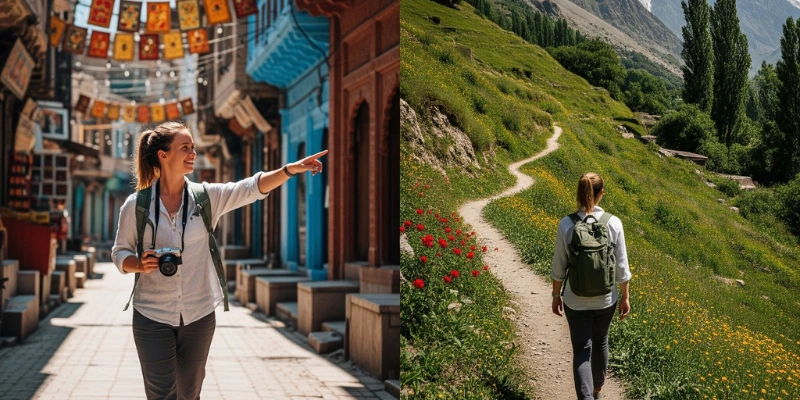
The Core of a Minimal Travel Camera Kit
Now let’s talk about what belongs in your minimal travel photography gear. Each piece has a role, and together they make the perfect travel setup.
1. The Camera Body
Your camera is the heart of your kit. A good option is a mirrorless camera.
- Fujifilm X-T2 – Light, easy to carry, and takes sharp photos. Great for travel.
- Sony Alpha series (like A6400 or A7C) – Small but powerful, with amazing low-light results.
- Canon EOS R series (like R10 or RP) – Beginner-friendly, good colors, and strong lens options.
Mirrorless cameras are lighter than most DSLRs, yet still deliver high-quality photos. Their size makes them easier to carry while exploring cities, hiking, or even on long trips.
2. The Right Lenses
Lenses are where many travelers overpack. Carrying too many can weigh you down and kill the fun. Instead, keep it simple with just one or two lenses that match your travel style. Here are some great picks across popular camera brands:
| For Fujifilm Users: |
|---|
|
| For Canon Users: |
|---|
|
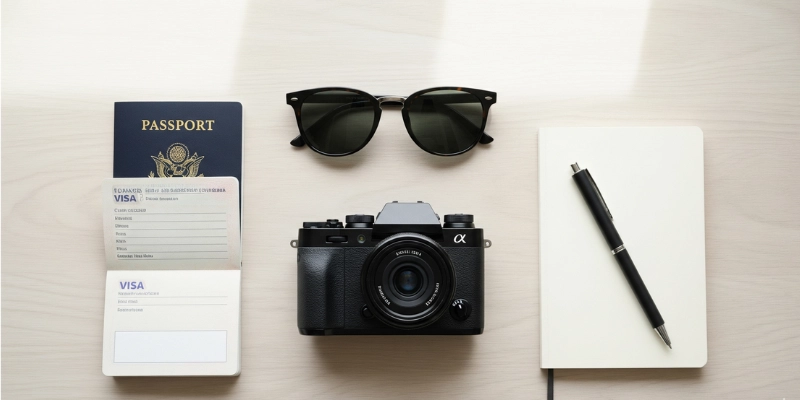
| For Nikon Users: |
|---|
|
| For Sony Users: |
|---|
|
| For Other Brands (Panasonic / Olympus – Micro Four Thirds): |
|---|
|
Tip: Choose lenses based on your personal style.
- Love wide cityscapes or mountain views? Take a wide-angle like 16 mm or 10-18 mm.
- Prefer portraits and people shots? A 35 mm or 50 mm prime is perfect.
- Want one lens for everything? Go with a 24-70 mm or 24-105 mm zoom.
Travel light. Your back will thank you, and you’ll spend more time taking photos instead of swapping gear.
3. Camera Strap
A good strap keeps your camera safe and comfortable. The Peak Design Slide Lite Camera Strap is a favorite because it’s soft, strong, and easy to adjust. No sore shoulders, no slipping.
4. Tripod
Tripods sound heavy, but you don’t have to carry the big ones. A lightweight travel tripod like the Rollei Compact Traveler No. 1 Carbon tripod is small but strong. It’s perfect for night photos, sunsets, and steady shots.
5. Small Accessories
Sometimes the little things make the biggest difference. Don’t forget:
- A filter case with lens filters to control light and color.
- Spare memory cards so you never run out of space.
- Spare batteries because power always runs out faster when you travel.
- A lens pen to clean dust and smudges quickly.
6. Camera Bag or Backpack
Your gear needs a safe home. Pick a camera backpack that looks simple, has hidden zippers, and feels comfortable on your shoulders. A low-profile bag also makes you look less like a target for theft.
Why Carry Less Photography Gear While Traveling?
When you travel, you want to enjoy the trip, not just carry heavy bags. Big cameras, many lenses, and tripods can make you tired. They also take up space in your backpack.
That is why many travelers like minimal travel photography gear. It means you carry only the tools you really need. Small and light gear helps you move freely, take photos quickly, and enjoy the journey more.
Think about this: you are walking in a busy street market, and you see a beautiful moment, a child laughing, an old man selling tea, or the light hitting a mosque. If your gear is simple, you can take the photo fast. But if you are busy opening big bags and changing lenses, you might miss that moment.
Minimal gear also keeps your trip safe. Heavy and shiny gear can attract attention, but a small camera or phone looks simple and easy to carry.
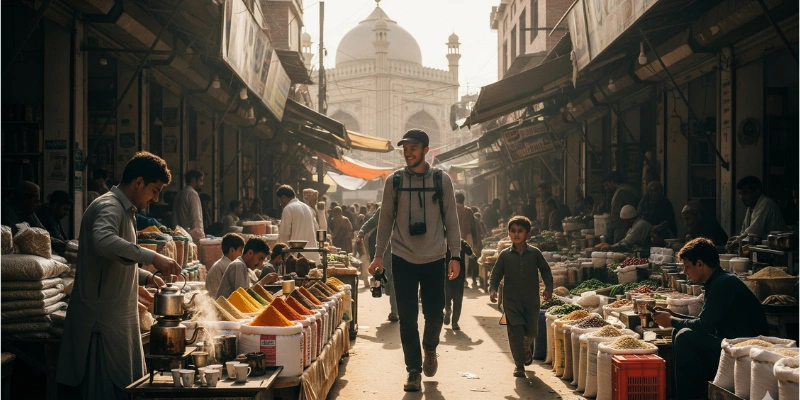
Personal Example: Once, when I was in Swat, I carried only my phone and a small tripod. Many travelers around me had big cameras, and they spent a lot of time setting up. I just took my phone out and captured the river, mountains, and even kids playing football. My photos were quick, natural, and full of life.
A minimalist travel camera kit helps you:
- Save energy by carrying less weight.
- Blend in and look less like a tourist with expensive gear.
- Move quickly and enjoy more freedom.
- Focus on your photos instead of worrying about your bag.
A common thought among photographers is that the right camera is the one you already have in hand. If your gear is too heavy, you might leave it in the hotel. But with light gear, you’ll always be ready to shoot.
So, carrying less gear is not only about weight, it is about freedom, speed, and enjoying your trip fully.
Travel Photography Essentials – How to Pack Smart?
In my early travel days, I made the same mistake many photographers do. I carried too many lenses, thinking I would use them all. Instead, my bag became so heavy that I often left my camera in the hotel. I missed moments I wish I had captured, street life, sunsets, little details of daily culture, simply because I didn’t want to drag that weight around.
That’s when I realized: packing smart is as important as the gear itself.
Here’s how you can do it:
- Take only one camera body.
- Choose one or two lenses, not the whole collection.
- Add only the must-have accessories (batteries, filters, cards).
- Carry a compact tripod only if you plan to shoot at night or long exposures.
- Keep everything organized in a lightweight travel backpack.
This way, you don’t waste time sorting through gear and can focus more on the journey itself.
Smartphone vs DSLR – Which is Better?
Both smartphones and DSLR cameras can take good travel photos. But they are different.
Smartphones
| Good things: |
|---|
|
| Not so good things: |
|---|
|
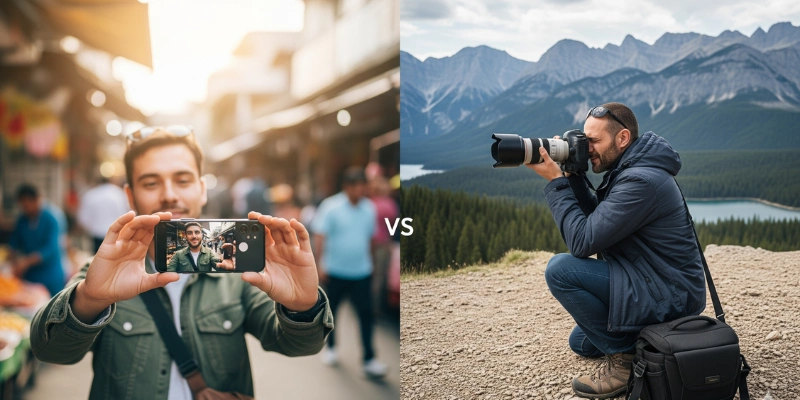
DSLR Cameras
| Good things: |
|---|
|
| Not so good things: |
|---|
|
Simple Tip:
If you just want easy travel photos, a phone is enough.
If you love photography and don’t mind weight, then a DSLR is good.
Why Minimal Photography Gear Makes You a Better Photographer
Here’s the truth: less gear can make you more creative. When you don’t have ten lenses, you stop worrying about which one to use. Your focus stays on the subject, the lighting, and how you capture the moment.
Many famous photographers believe that limits can push creativity. By carrying minimalist travel photography essentials, you challenge yourself to capture the world in a simple but powerful way.
Budget-Friendly and Portable Gear
You don’t need to spend a lot of money to take good travel photos. Many people search for cheap and lightweight gear that still works well. The good news is, you have options.
- Budget Cameras: Brands like Canon M50, Sony a6000, or Nikon Z30 give you nice image quality without a heavy price tag. These cameras are also small, which makes them easy to carry in a backpack.
- Used Gear: Buying second-hand cameras or lenses can save a lot of money. Many stores and online markets sell used gear in good condition.
- Smartphones: If your budget is very low, a good smartphone is enough for travel photography. Phones are light, always with you, and many have strong cameras today.
Tip: Spend more on one good lens instead of many lenses. A small zoom lens (like 18-55mm) or a fast prime lens (like 35mm) can cover most of your travel needs. This keeps your kit light and your cost low.
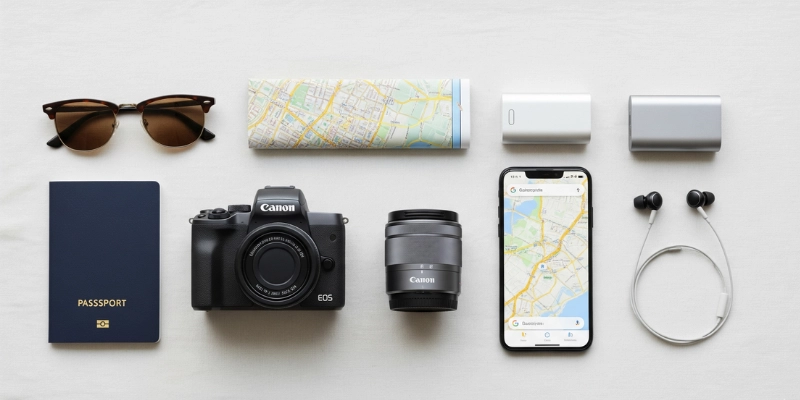
Tips to Take Better Travel Photos
No matter if you use a phone or a DSLR, these tips can help you take better pictures.
1. Use Natural Light
- Morning and evening light is soft and golden.
- Midday sun can be too bright.
2. Hold Your Camera Steady
- Use both hands.
- Or lean on a wall or rock to keep it still.
3. Add People or Objects
- A person, bike, or tree makes the photo look more alive.
- It shows the size of mountains, lakes, or buildings.
4. Try Different Angles
- Don’t just stand straight.
- Bend down or take a shot from above.
- Angles make photos more fun.
5. Keep It Simple
- Too many things in a photo look messy.
- Focus on one main subject.
| Quick Tips for Using Minimal Travel Gear |
|---|
Final Thoughts
In the last, I would say to you that Travel is about freedom, the freedom to move, to explore, and to live in the moment. Your camera gear should never hold you back. I’ve learned the hard way that carrying too much makes you tired, but carrying less makes you see more.
With minimal travel photography gear, you don’t just save your back, you save your focus. You notice details, connect with people, and capture the world in a way that feels true.
All you really need is a mirrorless camera, one or two lenses, a strong strap, a compact tripod, and a few small accessories tucked safely into a good camera bag. That’s it. Simple, light, and powerful.
So pack light. Walk far. Shoot often. And let your photos tell the story of places you’ve been and moments you’ll never forget.
And one more thing, if you have a travel story, personal photography experience, or useful data about gear and packing, share it with us. We’d love to read it, and who knows? We might publish your story so others can learn from your journey, too.
FAQs
It means carrying only the basic camera gear you really need. Usually, this includes one camera, one or two lenses, a strap, a small tripod, and a few small items like batteries and memory cards.
Heavy bags make you tired. If your gear is too heavy, you may leave it in the hotel and miss good photo moments. Minimal gear is light, easy to carry, and helps you enjoy your trip more.
Yes! Modern smartphones can take amazing photos. If you don’t want to carry a camera, your phone is enough for street photos, landscapes, and even night shots with the right apps.
Some good low-cost and light options are the Canon M50, Sony a6000, and Nikon Z30. They are easy to use and not very expensive.
Most travelers only need one or two lenses. A wide lens for landscapes and a small prime lens (like 35mm) for portraits or street shots is enough for most trips.
Only if you want night shots, sunsets, or long exposure photos. A small, lightweight travel tripod is better than carrying a heavy one.
Choose a light backpack that doesn’t look too much like a camera bag. This keeps your gear safe and also makes you look less like a tourist carrying expensive equipment.
No. Even many pro photographers travel light. Minimal travel photography gear helps you focus on the story, not the weight.

- Be Respectful
- Stay Relevant
- Stay Positive
- True Feedback
- Encourage Discussion
- Avoid Spamming
- No Fake News
- Don't Copy-Paste
- No Personal Attacks

- Be Respectful
- Stay Relevant
- Stay Positive
- True Feedback
- Encourage Discussion
- Avoid Spamming
- No Fake News
- Don't Copy-Paste
- No Personal Attacks


